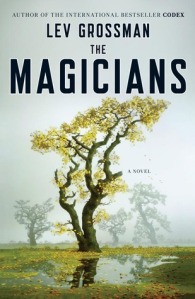By: Lev Grossman
Magicians Trilogy Book 1
Fiction
2009
Subject Matter: College students; College graduates; Magic; Psychological fiction
Rating: 1.5/5
The Magicians got a lot of hype.
I’m not really sure why.
I didn’t enjoy much at all about this book.
Somebody must. They’re making it a TV series and Lev Grossman‘s a best-selling author, so maybe I’m crazy.
Grossman’s story centers on a young man named Quentin Coldwater who grew up reading about Fillory, a magical land that forms the setting for a popular children’s series (sort of like kids who grew up reading Harry Potter). He ends up being summoned to a magical college and thinks all of his dreams are coming true blah blah blah but is super dissatisfied all of the time because he’s literally the whiniest little bitch character I’ve read in a long time.
You can call it “adult themes” or “unfulfillment” or “teenage angst” (except when he’s no longer a teenager…). Whatever. It’s annoying.
I had a lot of issues with this book. First of all, I’d say probably 90% of it felt copped from some other, more well-written, more famous fantasy book like Harry Potter or The Chronicles of Narnia or any number of YA fiction.
The college Quentin attends for roughly the first half of this novel is a little like Hogwarts in that it’s a remove from the regular world, inaccessible to ordinary humans by way of a massive protection of spells. The quirky headmaster, called Dean Fogg, has a quirky half-dead/half-alive bird in his office (can anyone say Dumbledore and Fawkes?). The school participates in an all-magician sport, called welters not quidditch, but come on. This Fillory that Quentin is so obsessed with is accessed by one of the characters by climbing through a grandfather clock…
And then the writing itself is awkward at best. It’s like a freshman trying to hard in an upper level creative writing seminar. Someone who’s never been told, “Show not tell.”
How weird, Quentin thought, with no curiousity at all, that [the flowers] would be alive in November.
It makes me cringe.
And Grossman also has an annoying habit of saying it was “not” something, instead of it was something else. Like, he was “not visibly disappointed” instead of he “was pleased” or whatever.
And he uses autistic several times as an adjective to describe intense focus, which just feels wrong.
Speaking of insensitivity, there’s this lovely sentence:
She was, to the best of Quentin’s ability to gauge these things, a lesbian.
Wat.
First of all, that has literally zero to do with the storyline. Nothing. Nada. It comes after a long physical characterization of a woman Quentin meets, and I think it’s supposed to help you draw the image of a rather butch female, but seriously?
Grossman throws in curse words, but not naturally. It’s like he thinks Quentin is supposed to curse because he’s a teenage/early 20s male, so he drops the f-bomb in random places. There’s a whole sentence that just reads, “Fucking women.” Is that an verb or an adjective? (I know it’s an adjective; I know I’m being cruel. But trust me, it’s awkward.)
There are unrelated vignettes that feel intrusive, as though they weren’t originally part of the story, but Grossman needed to sow some seeds for a major plot point so went back and wrote irrelevant introductions.
And then there’s this beyond strange depiction of Quentin and his friend being turned into foxes and “something crazy and urgent” triggered by “vulpine hormones and instincts” happens. I won’t go into more details, but Grossman sure does.
Another scene that really got to me comes at the end, so I can’t give too many details without spoiling. Quentin is face-to-face with a godlike creature, and he’s angry and rebellious and questioning this god’s authority. He asks:
How come You’re down here in this dungeon, and not up there on the surface helping Your people? … I think a lot of people are wondering where You’ve been all this time. That’s all. Why would You let Your people suffer like that?”
And anyways, it just made me wonder if, like so many great fantasy novels, we’re supposed to draw parallels with religion. If not, this is a weird scene. If yes, then I have absolutely no idea what side Grossman is trying to support. None.
I don’t know what age group this is aimed at. I guess young adult? But there’s floppy talking bears and life-sized bunnies too… And by the end, Quentin has to be 24 or 25. So it’s very confusing.
But I wouldn’t recommend this book anyway, so I guess it doesn’t matter.
*****
Here are some books in a similar (but better) vein:
(for magical YA fiction)
Harry Potter and the Sorcerer’s Stone by J. K. Rowling
Eragon by Christopher Paolini
A Wizard of Earthsea by Ursula K. Le Guin
The Golden Compass by Philip Pullman
(for books with whiny protagonists)
The Hunger Games by Suzanne Collins
(for books about other dimensions)
Neverwhere by Neil Gaiman
A Wrinkle in Time by Madeleine L’Engle
The Chronicles of Narnia by C. S. Lewis
The Gunslinger by Stephen King
(for more by Grossman)
The Magician King by Lev Grossman
The Magician’s Land by Lev Grossman
Codex by Lev Grossman
Warp by Lev Grossman
Coming up:
The Crimson Petal and the White by Michel Faber
A Thousand Splendid Suns by Khaled Hosseini
